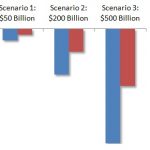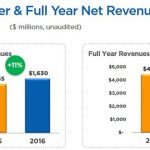Thinking plummeting oil prices are good for the economy is a mistake. They instead, as I said in The Price Of Oil Exposes The True State Of The Economy point out how bad the global economy is doing. QE has been able to inflate stock prices way beyond anything remotely looking fundamental, but energy prices have now deflated instead of stocks. Something had to give at some point. Turns out, central banks weren’t able to inflate oil prices on top of everything else. Stocks and bonds are much easier to artificially inflate than commodities are.
The Fed, ECB, BOJ, and PBoC may of course yet try to invest in oil, they’re easily crazy enough to try, but it will be too late even if they did. In that sense, one might argue that OPEC – or rather Saudi Arabia – has gifted us QE4, but the blessings of the ‘low oil price stimulus’ will of necessity be both mixed and short-lived. Because while the lower prices may free some money for consumers, not nearly all of the freed up ‘spending space’ will end up actually being spent. So in the end that’s a net loss as far as spending goes.
The ‘OPEC Q4? may also keep some companies from going belly up for a while longer due to falling energy costs, but the flipside is many other companies will go bust because of the lower prices, first among them energy industry firms. Moreover, as we’re already seeing, those firms’ market values are certain to plummet. And, see yesterday’s essay linked above, many of the really large investors, banks, equity funds etc are heavily invested in oil and gas and all that comes with it. And they are about to take some major hits as well. OPEC may have gifted us QE4, but it gave us another present at the same time: deflation in overdrive.
You can’t force people to spend, not if you’re a government, not if you’re a central bank. And if you try regardless, chances are you wind up scaring people into even less spending. That’s the perfect picture of Japan right there. There’s no such thing as central bank omnipotence, and this is where that shows maybe more than anywhere else. And if you can’t force people to spend, you can’t create growth either, so that myth is thrown out with the same bathwater in one fell swoop.
Some may say and think deflation is a good thing, but I say deflation kills economies and societies. Deflation is not about lower prices, it’s about lower spending. Which will down the line lead to lower prices, but then the damage has already been done, it’s just that nobody noticed, because everyone thinks inflation and deflation are about prices, and therefore looks exclusively at prices.
It’s like a parasite can live in your body for a long time before you show symptoms of being sick, but it’s very much there the whole time. A lower gas price may sound nice, but if you don’t understand why prices fall, you risk something like that monster from Alien popping up and out.
I had started writing this when I saw a few nicely fitting articles. First, at MarketWatch, they love the notion of the stimulus effects. They even think a ‘consumer-spending explosion’ is upon us. They’re not going to like what they see. That is, not when all the numbers have gone through their third revision in 6 months or so.
Welcome to the new era of QE4. As if on cue, OPEC stepped in just as monetary policy (at least the Fed’s) has dried up. Central bankers have nothing on the oil cartel that did just what everyone expected, but has still managed to crush oil prices. Protest away about the 1% getting richer and how prior QE hasn’t trickled down to those who really need it, but an oil cartel is coming to the rescue of America and others in the world right now.
It’s hard to imagine a “more wide-reaching and effective stimulus measure than to lower the cost of gas at the pump for everyone globally,” says Alpari U.K.’s Joshua Mahoney. “For this reason, we are effectively entering the era of QE4, with motorists able to allocate more of their money towards luxury items, while firms are now able to lower costs of production thus impacting the bottom line and raising profits.”
The impact of that could be “bigger than anything that has come before,” says Mahoney, who expects that theory to be tested and proved, via sales on Black Friday and the holiday season overall. In short, a consumer-spending explosion as we race to the malls on a full tank of cheap gas. Tossing in his own two cents in the wake of that OPEC decision, legendary investor Jim Rogers says it’s a “fundamental positive for anybody who uses oil, who uses energy.” Just not great if you’re from Canada, Russia or Australia, he says. Or if you’re the ECB, fretting about price deflation. Or until it starts crushing shale producers.













Leave A Comment